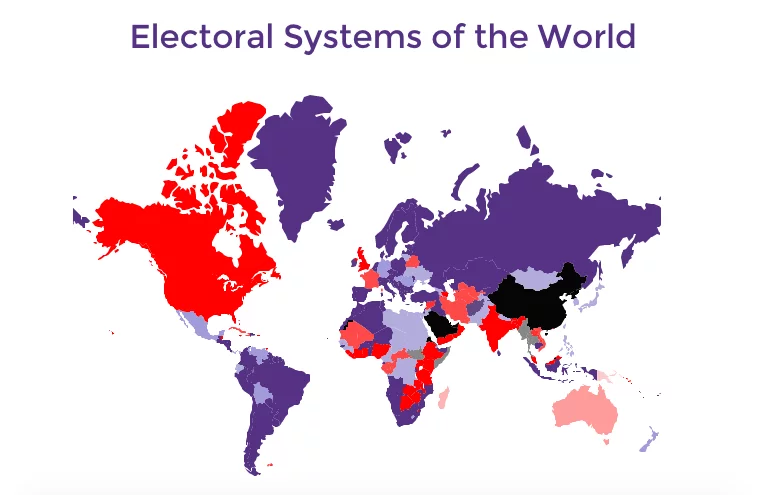Electoral Systems and Political Outcomes - A Deep Dive
Explore how electoral systems impact political outcomes. Discover key insights into electoral systems' influence on politics

The Crucial Role of Electoral Systems in Shaping Political Outcomes
In the dynamic realm of politics, electoral systems play a pivotal role in shaping political outcomes. They act as the fundamental framework within which political movements, advocacy groups, and candidates operate. In this era of the United Democracy Project, where civic engagement is on the rise and Senate races in 2024 are eagerly anticipated, understanding the significance of electoral systems is more crucial than ever. This article explores the intricate relationship between electoral systems and political outcomes, delving into the role they play in influencing political rallies, political movements, and the efforts of organizations like the Senate Majority PAC engaged in political advocacy.
Electoral Systems: The Bedrock of Democracy
Electoral systems, at their core, are the rules and procedures that govern the conduct of elections. They encompass aspects like how votes are cast, counted, and translated into seats or positions of power. Electoral systems serve as the foundation of any democratic society, shaping the dynamics of political representation and decision-making.
Proportional Representation vs. First-Past-the-Post
One of the key distinctions among electoral systems is the choice between proportional representation and first-past-the-post systems. In first-past-the-post systems, candidates who receive the most votes in each district win, whereas proportional representation systems allocate seats based on the percentage of votes a party receives. The choice between these systems has far-reaching consequences.
Influence on Political Movements: Proportional representation systems often encourage the proliferation of smaller political parties and movements. In such systems, every vote counts, leading to more diverse representation and fostering the growth of niche political movements. In contrast, first-past-the-post systems can lead to a two-party dominance, as they favor larger, more established parties.
Impact on Political Rallies: The electoral system influences campaign strategies and the frequency and nature of political rallies. In first-past-the-post systems, candidates may focus their efforts on key swing districts, leading to intense political rallies in those areas. Conversely, proportional representation systems require parties to campaign broadly, resulting in a wider distribution of rallies across regions.
Gerrymandering and Electoral Integrity
Electoral systems also impact the issue of gerrymandering, which involves the manipulation of electoral district boundaries to favor a particular political party. The extent to which gerrymandering occurs can significantly affect political outcomes.
Senate Races in 2024: In the upcoming Senate races in 2024, the manner in which electoral districts are drawn will determine the competitiveness of these races. Gerrymandering can create safe seats for incumbents, discouraging political competition and limiting the potential for change.
The Role of the United Democracy Project: Organizations like the United Democracy Project play a crucial role in promoting electoral integrity. Through legal advocacy and public awareness campaigns, they work to ensure that electoral systems are fair and that gerrymandering is minimized. Their efforts are instrumental in shaping the political landscape and ensuring that the outcomes of Senate races are determined by the will of the voters.
Political Advocacy and the Senate Majority PAC
Political advocacy groups, such as the Senate Majority PAC, are integral to the electoral process. These organizations work to influence political outcomes by supporting candidates and issues aligned with their goals.
Role in Shaping Political Outcomes: The Senate Majority PAC is focused on supporting Democratic candidates in Senate races. Its influence can be substantial, as it can allocate resources strategically in races where the outcome may be closely contested. The effectiveness of such organizations hinges on the electoral system in place.
The Influence of Electoral Systems: Electoral systems that allow for campaign financing transparency and restrict the influence of money in politics can level the playing field for advocacy groups. In contrast, systems that permit unchecked campaign spending can make it challenging for advocacy organizations to compete effectively.
Challenges and Opportunities in Electoral Systems
While electoral systems are fundamental to democracy, they are not without their challenges and opportunities. It's essential to recognize these aspects, as they further highlight the complex relationship between electoral systems and political outcomes.
Voter Suppression and Inclusivity
Inclusive electoral systems are vital to ensure that all eligible citizens have the opportunity to participate in the political process. However, challenges such as voter suppression can hinder inclusivity.
Voter Suppression: Some electoral systems may be more susceptible to voter suppression efforts, which can disproportionately impact certain demographics. This can skew political outcomes by limiting the voices of marginalized communities.
Efforts for Inclusivity: Political movements and advocacy groups like the United Democracy Project are actively working to combat voter suppression and promote inclusive electoral systems. Their efforts involve voter education, legal action, and grassroots organizing to ensure that every citizen's voice is heard.
The Role of Political Movements
Political movements are often the driving force behind change and can shape political outcomes significantly. The electoral system can either facilitate or impede the impact of these movements.
Leveraging Electoral Systems: Movements can leverage different aspects of electoral systems to further their goals. For instance, in proportional representation systems, coalitions and alliances between parties may be more common, allowing movements to find political allies more easily.
Responsive Electoral Systems: When electoral systems are responsive to the evolving needs and demands of society, they can provide opportunities for new movements to emerge and influence the political landscape. This adaptability is crucial in ensuring that the political process remains reflective of the populace.
The Global Perspective
Electoral systems vary widely across the globe, and their impact on political outcomes can be observed in different contexts.
Comparative Analysis: By examining the electoral systems of various countries, researchers and political analysts can draw valuable insights into their strengths and weaknesses. This analysis can inform discussions about potential reforms or adjustments to improve the fairness and representativeness of electoral systems.
International Collaboration: International organizations and alliances can play a role in advocating for fair electoral systems globally. The sharing of best practices and the promotion of democratic norms are essential in fostering political outcomes that uphold the principles of justice and equality.
The role of electoral systems in shaping political outcomes is a multifaceted and dynamic one. As the United Democracy Project and other political advocacy groups continue to mobilize for positive change in the upcoming Senate races in 2024 and beyond, it is crucial to recognize the challenges and opportunities presented by different electoral systems. A fair and inclusive electoral system is the cornerstone of a healthy democracy, allowing for the vibrant exchange of ideas, the flourishing of political movements, and the effective advocacy of organizations like the Senate Majority PAC.
Understanding the intricate relationship between electoral systems, political rallies, movements, and advocacy efforts is essential for citizens, policymakers, and advocates alike. It is through this understanding that we can work collectively to strengthen our democratic institutions, ensuring that they remain responsive to the will of the people and serve as a bulwark for justice, representation, and progress.
What's Your Reaction?





















